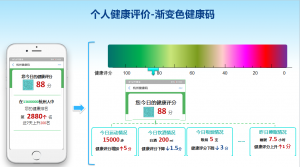Health codes were introduced in Hangzhou to help combat the spread of COVID-19. But now it looks like the codes might outlive the virus, with city residents being scored and ranked based on their health status, according to a proposal by local government officials.
Since February, people in cities across China have been assigned QR codes on their smartphones that come in either red, yellow, or green. Each color is supposed to indicate the likelihood someone had contact with the new coronavirus, with a green code letting someone travel freely, and yellow and red codes indicating people must quarantine for up to two weeks. The codes are based on a combination of big data and user-submitted information that includes travel history and whether someone has experienced symptoms.
The Hangzhou government is now looking at taking things further by including things like smoking and drinking habits. In a meeting held by the Hangzhou Municipal Health Commission last Friday, local officials proposed an upgraded health code system that integrates data from medical records, physical examinations, and “lifestyle management.”

According to pictures in the Hangzhou government’s press release, new health codes will rely on lifestyle-related data like how much a person drinks, smokes and exercises every day. It’s not clear how these would be assessed, but if the existing health code system is any indication, it could be based on user-submitted information.
In what looks like a simulated picture of the proposed system, a user would get five points for walking 15,000 steps in a day and get one point for sleeping 7.5 hours. But they would lose a point and a half for drinking 200 milliliters of baijiu, a popular fiery Chinese liquor, and lose three points for smoking five cigarettes.
The resulting tally is incorporated into a health score that generates a QR code with a correlating color and ranking. Colors closer to green indicate higher scores while colors closer to red are lower. In the simulation, a score of 88 out of 100 results in a turquoise QR code and a ranking of 2,880 out of 13.6 million Hangzhou residents. (The Hangzhou government’s official figure for the city’s permanent population was actually 10.36 million at the end of 2019.)
Read this: These industries face an uphill battle in recovery from the coronavirus crisis
The government’s press release doesn’t make it clear whether it intends to enforce the system as pictured. It was presented as a “design idea” by Sun Yongrong, the director of the Party Committee of Hangzhou Municipal Health Commission. The meeting where it was presented on Friday was held following an order to “advance the long-term operation” of the Hangzhou health code, according to the release.
The proposal also includes health codes for organizations, including companies and neighborhoods. These would be generated based on the habits of the people in the organization. So a company health code would be based in part on the average time employees spend sleeping and exercising, according to one example shown. It would also take into account the percentage of employees who had medical checks. As with individuals, a company’s health code would include a score and a ranking.
In its fight against COVID-19, China has relied on aggressive data collection to track people’s potential contact with the coronavirus. This has resulted in rampant data leaks, with personal information spread online leading to doxxing, spam calls, and online harassment. Experts have warned that aggressive surveillance measures may remain in place longer in China than elsewhere.
Read this: Asia’s post-virus economic revival to be built on the back of Chinese cloud services
When news of Hangzhou’s proposal broke, responses were overwhelmingly negative on Q&A site Zhihu and microblogging platform Weibo, where it became the second highest trending topic at one point. Many users decried the program’s invasion of privacy, saying it may lead to health-based discrimination when people are doing things like job hunting.
“Medical records, like bank account passwords, are people’s core privacy,” one Weibo user said. “How can we hand it over to big data?”
This article was originally published by Abacus News.

